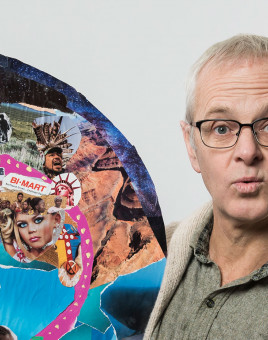
Matthew Eveleigh
Program / Year
Art Therapy ’21
Hometown
I was born in England, but Oregon has been home for nearly 30 years now.
What led you to enroll at Lewis and Clark's Graduate School of Education and Counseling?
I was one of those who was intending to pursue their Art Therapy MA at Marylhurst, and was so grateful that the program (due to the untiring efforts of Mary and others) was adopted by Lewis & Clark. I remain very grateful to all who made that happen, and we’ve been made to feel very welcome here.
Who or what inspired you to pursue your chosen field of study?
Major life transitions in middle age put me in front of the question of what I was going to do with the rest of my life and I felt it was time to use whatever capacities I might have to help others. For me, this meant using the arts as a form of healing among populations where it is most needed.
What does social justice mean to you?
For me, social justice means addressing the fallout from unregulated capitalism. The marginalization of those who are disadvantaged and discriminated against results in a situation where many people have needs that are not being met; mental health is of course a huge part of that, but by no means the only part. I see social justice as active efforts to work towards less of a gap between the concern for profit and concern for people, no matter who they are or where they come from.
How do you hope to apply your social justice education in your chosen career?
I hope to work in the Youth Corrections system and try to break the cycle of crime that arises from adverse childhood conditions.
Where have you been working/interning as a student, and what does that work entail?
At MacLaren Youth Correctional Facility in Woodburn, Oregon. At present I am running an art group there once a week.
What is the most fun part of your program?
The personalities of the young men in the [art] group [at the correctional facility].
What is the hardest part of your program?
Adapting to individual needs and facility; making sure there is individualized attention in the midst of a group project.
How would you describe your graduate school experience in one sentence?
Incredibly rich; mind-expanding and challenging.
Who has been your most influential professor, and why?
Probably Greg Crosby, who was with us at Marylhurst, who has been so supportive and a guide through the world of mental health. But I also have to mention Mary Andrus, Beth Ann Short and Kris Bella who were so crucial in bringing the program here and bring a wealth of art therapy experience to bear. Their practical knowledge is inspiring and so important.
What is a unique perspective you bring to your cohort?
I don’t know about unique, but there are three of us in our 50s in the cohort, and I feel we do add another dimension of life experience‚ for better or worse!
What career will you be pursuing after graduation? Did you intend for this to be your career path when you enrolled?
Yes, I’ll be pursuing a career as a board-certified art therapist.
Describe an "ah-ha" or "right-turn" moment you have experienced here - a time when your perspective, opinion, outlook, or goals changed suddenly due to a specific experience.
The growing recognition that we, as practitioners, need to stay in front of the same questions we ask of clients and make sure we apply all the principles (and techniques) to ourselves as well.
What do you think of Portland?
It’s changed so much since I first came (in 1992), but this part of the world remains home. I don’t spend as much time in town as I used to, as I live about 25 miles south. It is a nice size, but does lack many of the things a more diverse, larger community, has.
Graduate School of Education and Counseling is located in Rogers Hall.
MSC: 93
email graddean@lclark.edu
voice 503-768-6000
Dean Scott Fletcher
Graduate School of Education and Counseling
Lewis & Clark
615 S. Palatine Hill Road MSC 93
Portland OR 97219